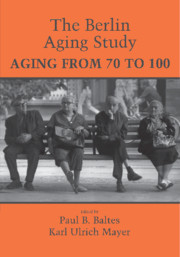Book contents
- Frontmatter
- Contents
- Acknowledgments
- Introduction
- Part A Theoretical Orientations and Methods
- Part B Major Results from the Four Research Units
- 5 Morbidity, Medication, and Functional Limitations in Very Old Age
- 6 Psychiatric Illnesses in Old Age
- 7 Trends and Profiles of Psychological Functioning in Very Old Age
- 8 Socioeconomic Conditions and Social Inequalities in Old Age
- Part C Interdisciplinary Findings
- Part D Overview and Outlook
- Notes on Contributors
- Abbreviations
- Author Index
- Subject Index
7 - Trends and Profiles of Psychological Functioning in Very Old Age
Published online by Cambridge University Press: 06 December 2010
- Frontmatter
- Contents
- Acknowledgments
- Introduction
- Part A Theoretical Orientations and Methods
- Part B Major Results from the Four Research Units
- 5 Morbidity, Medication, and Functional Limitations in Very Old Age
- 6 Psychiatric Illnesses in Old Age
- 7 Trends and Profiles of Psychological Functioning in Very Old Age
- 8 Socioeconomic Conditions and Social Inequalities in Old Age
- Part C Interdisciplinary Findings
- Part D Overview and Outlook
- Notes on Contributors
- Abbreviations
- Author Index
- Subject Index
Summary
This chapter describes the psychological and psychosocial status of the participants of the Berlin Aging Study (BASE). In the first section, we outline age trends in three domains: intelligence, self and personality, and social relationships. In the domain of intelligence, negative age differences between 70 and 103 years were substantial (representing a 1.8 SD difference in performance level and 35% of the interindividual variance) and were closely associated with indicators of biological deterioration. In contrast, age-related differences in personality, self-related beliefs, and social relationships were fewer and considerably smaller (approximately 0.5 SD). At a general level, these domains seemed to be less affected by age-related decline than is true for intellectual functioning. Closer examination, however, revealed that age differences on aspects of self, personality, and social relationships were all in a less-than-desirable direction. In advanced old age, individuals may be pushed to the limits of their adaptive psychological capacity.
A further question considered in the chapter concerns the overall systemic nature of psychological functioning in old age. Cluster analysis was used to identify nine subgroups of older individuals with different patterns of functioning across the three psychological domains. Four of these groups reflected various patterns of desirable functioning (47% of the sample), and five, less desirable functioning (53%). The relative risk of membership in the less desirable profile subgroups was 2.5 times larger for the very old (85–103 years) than for people between the ages of 70 and 84 years, and 1.3 times larger for women than for men. […]
- Type
- Chapter
- Information
- The Berlin Aging StudyAging from 70 to 100, pp. 197 - 226Publisher: Cambridge University PressPrint publication year: 1998
- 3
- Cited by



